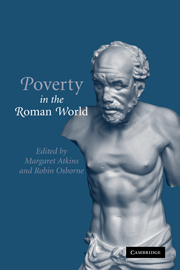Book contents
- Frontmatter
- Contents
- List of contributors
- Preface
- List of abbreviations
- Chapter 1 Introduction: Roman poverty in context
- Chapter 2 The poor in the city of Rome
- Chapter 3 Stratification, deprivation and quality of life
- Chapter 4 ‘You do him no service’: an exploration of pagan almsgiving
- Chapter 5 Writing poverty in Rome
- Chapter 6 Poverty and population in Roman Egypt
- Chapter 7 A pragmatic approach to poverty and riches: Ambrosiaster's quaestio 124
- Chapter 8 Portraying the poor: descriptions of poverty in Christian texts from the late Roman empire
- Chapter 9 Throwing parties for the poor: poverty and splendour in the late antique church
- Chapter 10 Salvian, the ideal Christian community and the fate of the poor in fifth-century Gaul
- Chapter 11 Poverty and Roman law
- Bibliography
- Index
Chapter 8 - Portraying the poor: descriptions of poverty in Christian texts from the late Roman empire
Published online by Cambridge University Press: 22 September 2009
- Frontmatter
- Contents
- List of contributors
- Preface
- List of abbreviations
- Chapter 1 Introduction: Roman poverty in context
- Chapter 2 The poor in the city of Rome
- Chapter 3 Stratification, deprivation and quality of life
- Chapter 4 ‘You do him no service’: an exploration of pagan almsgiving
- Chapter 5 Writing poverty in Rome
- Chapter 6 Poverty and population in Roman Egypt
- Chapter 7 A pragmatic approach to poverty and riches: Ambrosiaster's quaestio 124
- Chapter 8 Portraying the poor: descriptions of poverty in Christian texts from the late Roman empire
- Chapter 9 Throwing parties for the poor: poverty and splendour in the late antique church
- Chapter 10 Salvian, the ideal Christian community and the fate of the poor in fifth-century Gaul
- Chapter 11 Poverty and Roman law
- Bibliography
- Index
Summary
It is now rightly taken for granted that in their promotion of almsgiving Christian preachers of the late fourth and fifth centuries gave a new visibility through and in their texts to the poor and the very poor. This was the thesis ably advanced by Michael De Vinne in his still unpublished work, The Advocacy of Empty Bellies: Episcopal Representation of the Poor in the Late Empire, and cited with approval by Susan Holman in her recent discussion of how the poor are portrayed in sermons by the Cappadocian Fathers: ‘Because the better off throughout the Roman empire largely fail even to see the many destitute that wander through the streets of their cities, clergymen strive to render these unfortunate fully visible.’ This heightened visibility is indeed of great potential importance to the social historian seeking to construct an image of the poor and an account of the various forms of poverty experienced in this period. Chrysostom's assessment of how many at Antioch were rich, poor or between these two extremes is well known: ‘if both the wealthy, and those who rank immediately behind them, were to distribute amongst themselves those who lack bread and clothing, you would have difficulty in finding one poor person for every fifty or even every hundred of the others’.
Yet such ‘visibility’ in Patristic texts is not because the texts offer any simple window on the past or constitute a distortion-free mirror in which to view late antique society.
- Type
- Chapter
- Information
- Poverty in the Roman World , pp. 130 - 144Publisher: Cambridge University PressPrint publication year: 2006
- 3
- Cited by



